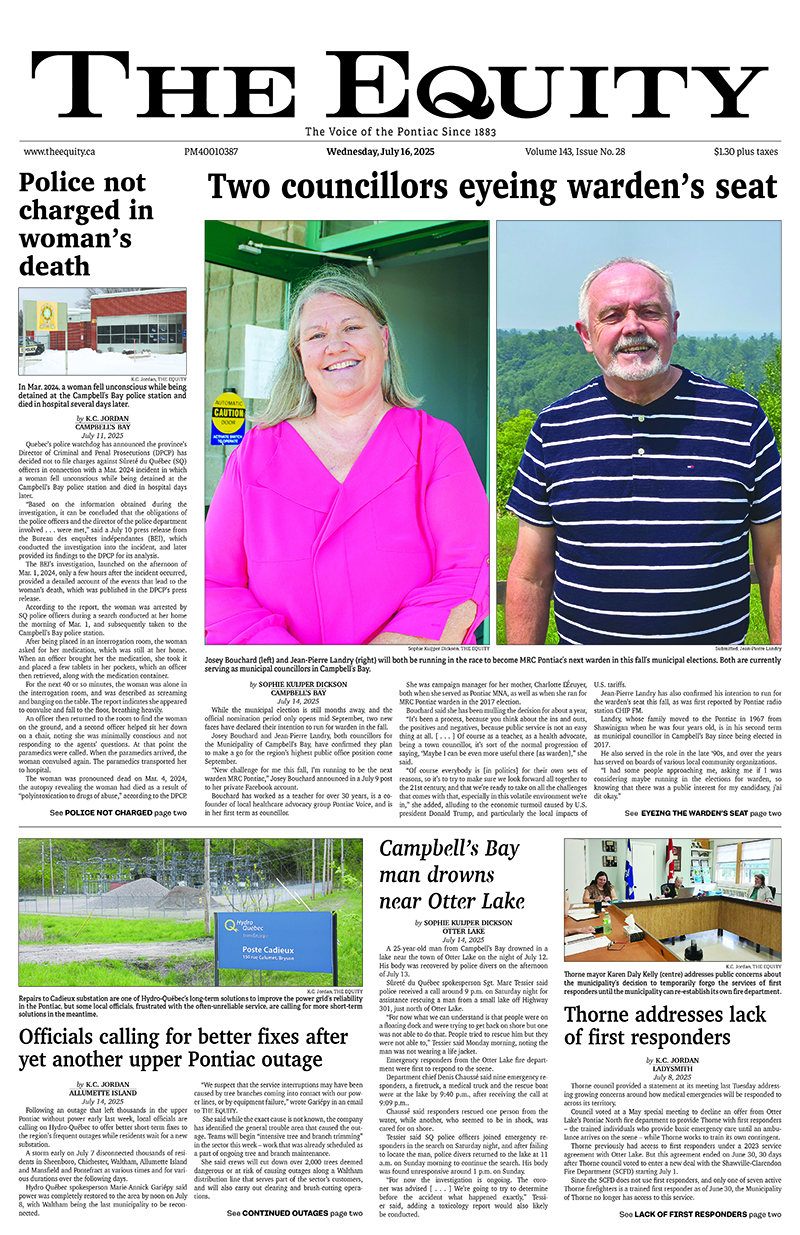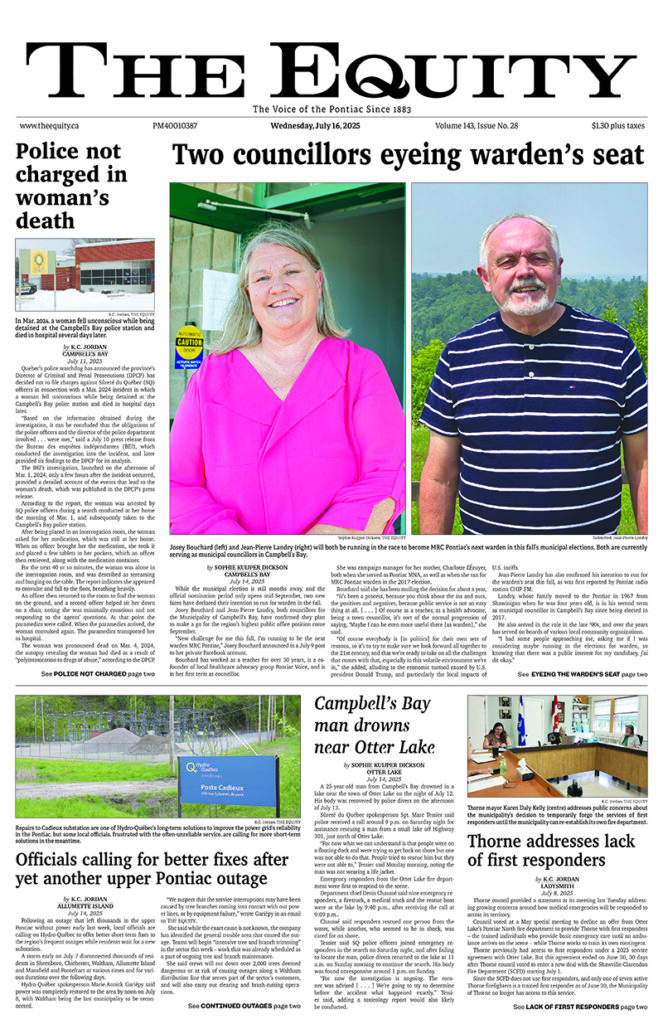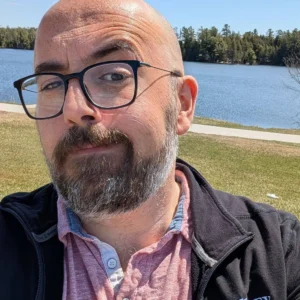One week out from THE EQUITY’s Conversation with the Candidates federal election event, and less than three weeks out from the election, we are sharing in-depth interviews with the five people vying for the Pontiac-Kitigan Zibi seat.
Each candidate was given the same word limit to answer our questions. The first three questions as well as the last question were put to every candidate, while the fourth, fifth and sixth questions were tailored to each candidate. Answers have been edited for clarity and length.
Q1: Why do you think you’re the best candidate to represent this specific corner of the riding, between Luskville and Rapides des Joachims, at the federal level?
I’m the best candidate because I’m a person that’s really present with the community. I went to Rapides des Joachims and I went to Luskville. I spent a lot of time in the west part of our riding. I want to be present with people, and I’m listening to people. Also, I’m a person of action. So, whenever there’s a request for anything they want, I’ll be there to answer their questions and find a solution to their problem or situation.
Q2: Workers in the MRC Pontiac earn on average $36,300 a year (according 2022 data from the Government of Quebec). What do you believe is the best strategy to promote economic development and bring more jobs to this region?
The MRC Pontiac is one of the poorest MRCs in Quebec, and this is unacceptable. We are rich in forestry, we’re rich in mines and I think what we have to do is not only exploit our materials, but also to transform the resource within our region, instead of sending our raw material all over the country or even to the United States. So, we should create jobs in our own riding and that way, we’re going to employ our local people at home. They won’t go to Ottawa or elsewhere in Quebec to work. If we can create new infrastructure, bring new industry to our riding, that will generate lots of work, and we’ll be able to build homes and keep people in our riding. We see a big decrease of the young population going outside of our area to work, because there’s no work where we are, and this is unacceptable. We are a rich area, and we have to promote this area. We have to widen our highways (the 148) so we can actually transport our goods and make it easier to bring our goods across Canada. If you want to promote our region, we have to change our infrastructure so we can bring industry and create jobs and build homes and bring new business to the area.
Q3: Aside from economic development, what would be one concrete change you’d like to make for the Pontiac region of the riding that would significantly improve life here?
We need proper infrastructure in place so that we can help people, like transportation infrastructure. We’re in the province of Quebec and we’re rich in electricity, and we should have a proper electricity source from Quebec. The other thing is the cell zone. I go to a lot of places and my cell phone drops all the time, so we need to be fiber optic everywhere. I know it’s there in some places but we need to bring it everywhere, to make people more comfortable staying in the area. We have to bring the Pontiac into 2025, we cannot live in 1950 anymore. And stores are closing at five o’clock, which I understand because there’s not enough people. As a business owner in the past, when there’s nobody after five, of course, you close down. But we need to do something with this area and I’m there to promote it and talk to people to see how we can do it.
Q4: For years, Pierre Poilievre has criticized the consumer carbon tax, which has now been eliminated, but was a policy that was proven to be curbing emissions. Now Poilievre wants the carbon tax to be removed from industry. He’s also promising to do away with environmental assessment programs to fast-track resource extraction. How serious a problem does your party think climate change is and what do you believe the federal government should be doing about it?
The carbon tax, first of all, it’s not eliminated. The Liberal Party only cancelled the consumer carbon tax, which affects us at the pump, especially in Ontario. So, the carbon tax creates inflation, and as we noticed in the last couple of days, the price difference is 19 or 20 cents a litre. So for the last four years, we’ve been paying 20 cents a litre extra, just for the carbon tax. It’s less money in our pocket that we can enjoy with our family. We have to reduce the tax so people can live. I’ve seen the price of food when we go do groceries almost double. As you mentioned, an average salary is $36,000, you can’t survive on this anymore.
And then, we have to stop the carbon tax on industry. There are also projects that can encourage the industry to look at green methodology to reduce carbon emissions. The Poilievre government wants to work with the industry to find solutions to make sure that the production of carbon is less so.
Even with the Liberals just offering an increase on the industry, that cost is going to be passed down to the consumer eventually and we’re going to be back to square one.
Climate change is a big thing and we all have to be aware of it and we have to do something about it. I believe technology should be used to combat climate change. When we look at the whole world, Canada is emitting maybe 1.8 per cent of the carbon. I know we have to do our share but we can’t take on the whole world. I believe that technology can make a big impact in reducing our emissions.
Q5: In a November interview with us, you said a priority of yours was improving the quality of life for seniors through policies that “no longer treat them as an afterthought,” but that “ensure they enjoy their golden years with dignity, financial security, and access to world-class healthcare.” Can you give some examples of what kinds of policies would achieve this?
I spent an afternoon last week at the Shawville CHSLD talking to people, and I know that all the caregivers are doing an amazing job. I’ve been going to the CHSLD in Hull and Gatineau for the last five years because my mother-in-law was there. And I look at the seniors that are more independent and they’re having a hard time right now. We have to give them more money in their pocket so they can enjoy their retirement and their life. Right now, the cost of renting a home or an apartment, it went up quite a bit. We made an announcement that senior citizens won’t have to pay federal tax anymore for the first $34,000 . . . because financial problems are really stressful for senior citizens. Even though it’s a provincial jurisdiction, I would love to help them out and find ways that the federal government can help the health system to make sure that not only our seniors but also the average person in the Pontiac can live and make sure that there’s service for them. As we all know, in Shawville, there’s a great hospital, the people are wonderful, but the province is cutting services. We have to bring those services back to our province and into our riding so that our people, who pay the tax, get the service they deserve.
Q6: Also in that November interview, you said you’re running for the Conservative Party because you believe in “individual freedom and the power of local communities to address local issues.” What does this mean, and how do you see the responsibility of an MP in this context?
As an MP, I’m there to represent all the citizens of the riding and the Pontiac. And I’m here to listen. When I was involved in the minor hockey association for 12 years, I was a present person. I was there at every meeting. I’m intending to do the same with this riding. And, as you know, we have a big riding and every area has different needs. I’m there to not only listen but be a person of action that will bring their issues to the next level, or talk to the province or the municipality and say how can we work together? As I promised before, once elected, every year, I’m going to have a town hall and we’re going to have a good chat for a day or evening, and they can tell me what the issues are. I’m not a person just for a photo op and just showing up to give a medal or certificate. And this is the reason why I joined politics: I was tired of watching the last government spend money like crazy and not being responsible with our dollars.
Q7: What’s one of the most important things you were taught by your parents, or somebody else who had a big influence in your life, that you would bring to the job of MP?
Family values, respecting people, listening to people, being a person of action. I’ve been working at [my family’s] store since I was nine years old with my parents, and you have to respect people, you have to be hard working. If you talk to my wife, she’ll tell you, when I get into something, I’m in there 200 per cent. I don’t mind going to bed at three o’clock in the morning working on a project. As you probably don’t know, I really believe in taking care of parents because they did everything for us. My in-laws, they’ve lived with us for 28 years. They come with us for any family outing. I never leave anybody behind, and I plan to do the same thing as a representative for this riding. I’m here to work with people, and I’m going to be working my butt off to make sure that the Pontiac gets back on the map.













